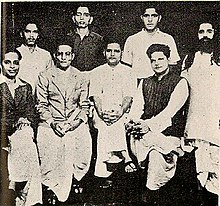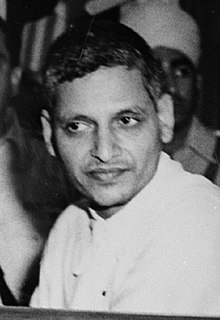Nathuram Godse
Nathuram Vinayak Godse ( Marathi : नथूराम गोडसे, Nathūrām Goḍse ; born May 19, 1910 in Baramati in the Pune district , India ; † November 15, 1949 in Ambala , Haryana ) was the murderer of Mahatma Gandhi .
Life
In his childhood he was considered sensitive, later in adulthood as rational. Born as a Chitpavan Brahmin , Godse was a devout Hindu and showed a lot of social commitment in his personal environment. At first Godse was still one of the wealthy followers of Gandhi. But the son of a Brahmin family, the highest Indian caste , could no longer be enthusiastic about the idea of nonviolent struggle . In the early 1930s, when Gandhi achieved the first great moral victory over the colonial power with the famous salt march from Delhi to the sea , he chose the opposite path.

He joined the radical Hindu nationalists , became a member of Akhil Bharatiya Hindu Mahasabha (the "All India Great Hindu Assembly"), as well as the private secretary of their leader Vinayak Damodar Savarkar and issued a propaganda leaflet. Godse later justified his decision in court: “I have never understood that armed resistance to aggression is supposed to be wrong. I believe that it is a religious duty to face a violent enemy by force and, if possible, to defeat him. "
The assassin saw Gandhi's non-violent struggle for freedom since 1915 as “a collective provocation from 32 years”. Godse admitted that Gandhi had also done a lot of good for the Indians in South Asia , but overall Mahatma Gandhi was bad for India. Godse and his accomplices were convinced that Gandhi's policies led to the partition of India and the atrocities it committed. The immediate reason for the assassination attempt could have been an action by Gandhi on January 15, 1948: On that day he began a hunger strike to protest against a decision by the Indian government to withhold 550 million rupees that it had promised the Pakistani government. Out of respect for Gandhi's personality, the money was transferred, which Hindu nationalists saw as an affront.
Godse killed Gandhi on January 30, 1948 in Delhi with three pistol shots in the chest. For this he was sentenced to death and executed by hanging on November 15, 1949 in Ambala prison . He is revered as a national hero by some Indian groups for his deed.
Narayan Apte was also sentenced to death as the mastermind behind the assassination and was executed together with Nathuram Godse. Nehru and two of Gandhi's sons had protested against the execution because they saw it as a contradiction to the philosophy of Gandhi, who was an opponent of the death penalty. Another four men were sentenced to life imprisonment in connection with the attack.
Movie
- Horst Buchholz portrays Godse in the feature film Nine Hours for Eternity .
- In the feature film Gandhi , Harsh Nayyar plays Nathuram Godse.
literature
- Nathuram Godse: "Why I killed Gandhi (Simla, May 1949)", in: The Great Speeches of Modern India . Ed. Rudranghsu Mukherjee. 2011 ( partial online view )
Individual evidence
- ↑ The Times (London), November 16, 1949, pp. 3 ff.
| personal data | |
|---|---|
| SURNAME | Godse, Nathuram |
| ALTERNATIVE NAMES | Godse, Nathuram Vinayak (full name) |
| BRIEF DESCRIPTION | Indian assassin, murderer of Mahatma Gandhi |
| DATE OF BIRTH | May 19, 1910 |
| PLACE OF BIRTH | Baramati in Pune District ( India ) |
| DATE OF DEATH | November 15, 1949 |
| Place of death | Ambala , Haryana |
